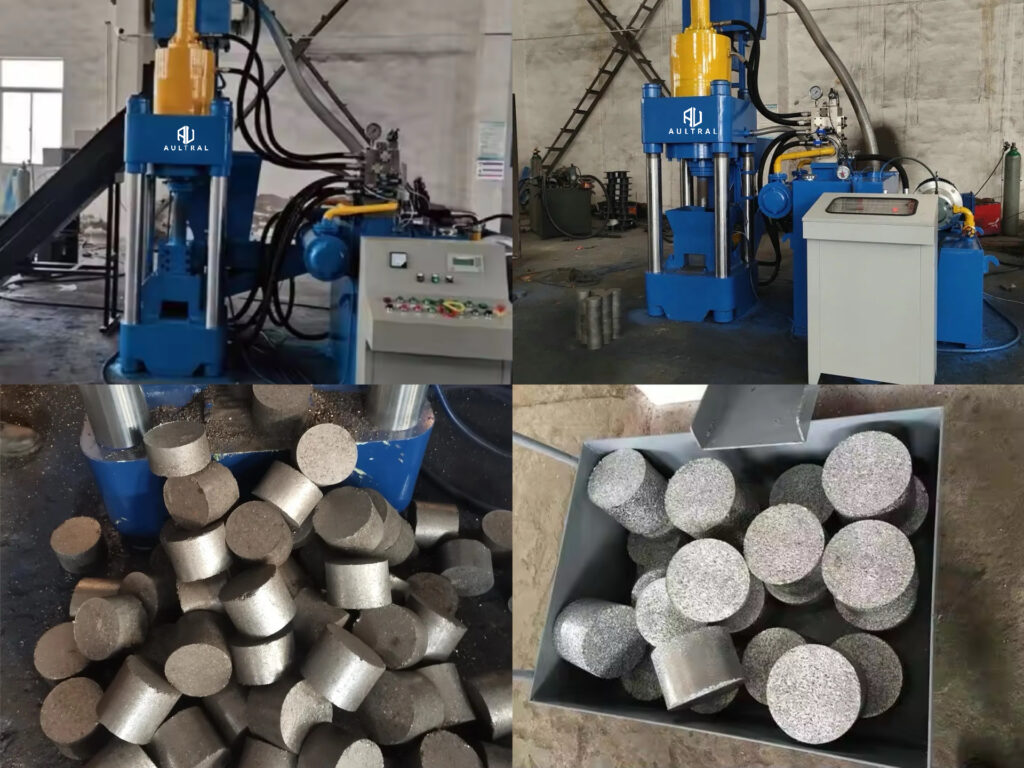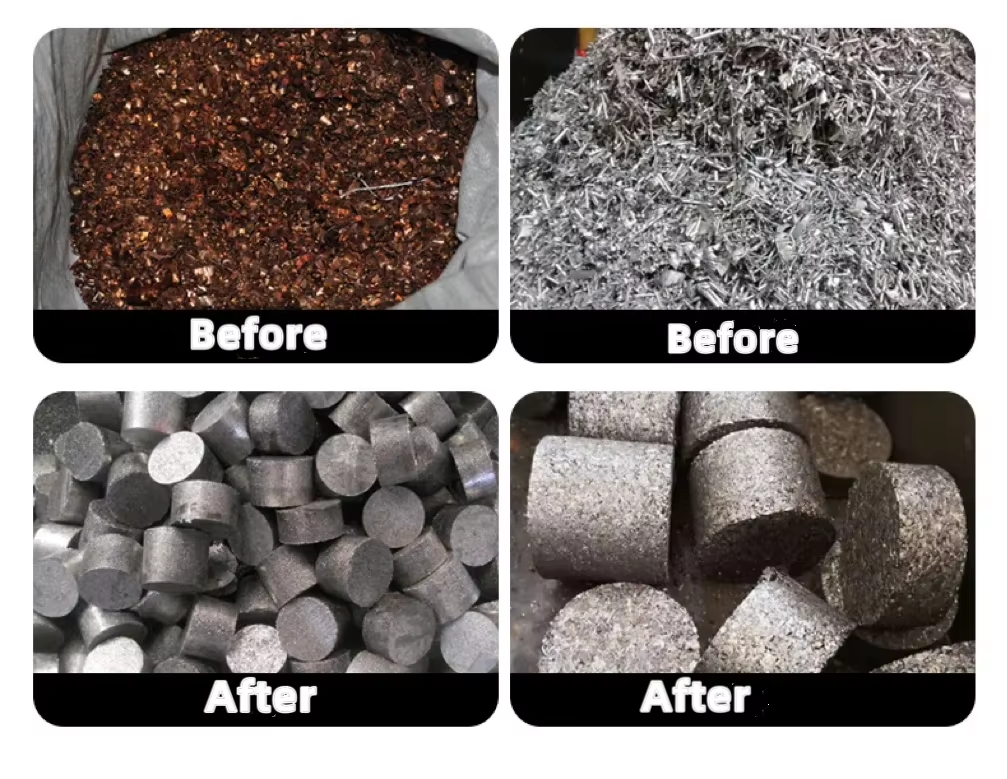In today’s manufacturing industry, efficiency and sustainability are key factors in maintaining a competitive edge. One of the most effective ways to improve both is through the use of a Metal Chip Briquetting Machine. These machines help manage the waste generated during metalworking processes by converting metal chips into compact, reusable briquettes. In this article, we will explore what a metal chip briquetting machine is, its benefits, and its various applications in industrial settings.

A Metal Chip Briquetting Machine is a specialized piece of equipment used in industrial environments to compress metal chips, swarf, and shavings into dense, solid briquettes. These machines help reduce the volume of waste material produced during machining processes, such as cutting, drilling, and grinding of metals. The metal chips produced are often discarded as waste, but with the briquetting process, they are transformed into compact, valuable briquettes that can be easily stored, transported, or recycled.
The machine works by applying hydraulic or mechanical pressure to the metal chips, forcing them into a mold. The result is a high-density, uniform briquette that can be reused for several purposes.
Key Benefits of Metal Chip Briquetting Machines
1. Waste Reduction
Metalworking processes often result in a significant amount of waste in the form of chips, swarf, and scrap metal. Disposing of this waste can be costly and inefficient. Metal chip briquetting machines minimize the volume of this waste, enabling manufacturers to save on disposal fees and reduce the environmental impact of their operations.
2. Enhanced Recycling
Once the metal chips are compressed into briquettes, they become more valuable for recycling. The compact form allows for easier storage and transportation to recycling centers, where the material can be melted down and reused. This process is highly sustainable and supports a circular economy within the metalworking industry.
3. Increased Profitability
By compressing waste metal into briquettes, manufacturers can turn what was once considered waste into a resource that can be sold or reused. This process not only reduces costs associated with disposal but also allows companies to generate revenue from their waste material, boosting overall profitability.
4. Improved Work Environment
A Metal Chip Briquetting Machine helps in maintaining a cleaner and safer workplace. The reduction of metal chips and swarf lying around the shop floor reduces the risk of accidents, improves worker safety, and promotes a more organized environment.
5. Space Optimization
Metal chips and scrap often take up valuable space on the factory floor. Briquetting the chips into dense, compact forms frees up space, allowing companies to optimize their workflow and storage capacity.
How Does a Metal Chip Briquetting Machine Work?
The operation of a Metal Chip Briquetting Machine involves the following basic steps:
-
Feeding the Chips: Metal chips, swarf, or scrap metal are fed into the machine’s hopper. These are usually collected directly from machining operations.
-
Compaction Process: Once the metal chips are inside the machine, a hydraulic or mechanical system applies high pressure to compress the chips into a mold. This pressure removes any excess oil, moisture, and air, resulting in a dense, uniform briquette.
-
Molding: The briquettes are then formed into solid shapes that are easy to handle, store, or transport. The molds can be customized to produce different shapes and sizes based on the specific needs of the company.
-
Cooling and Ejection: After the briquettes are formed, they are allowed to cool down and are then ejected from the machine. These briquettes can be stored, sold, or sent to a recycling facility.
Applications of Metal Chip Briquetting Machines
Metal chip briquetting machines are versatile and can be used in various industries that involve metalworking. Some of the key applications include:
1. Automotive Industry
In the automotive industry, machining processes produce significant quantities of metal chips. Briquetting these chips reduces waste and supports the recycling of valuable materials, such as aluminum and steel, which are commonly used in vehicle manufacturing.
2. Aerospace Manufacturing
The aerospace industry requires precision machining of metals like titanium, aluminum, and stainless steel. A Metal Chip Briquetting Machine helps streamline the waste management process by turning the chips into valuable briquettes that can be recycled or reused.
3. Metal Fabrication
Metal fabrication shops often generate large amounts of waste, including swarf and scrap. By using a briquetting machine, these businesses can minimize waste and recover more material, contributing to both sustainability and cost savings.
4. Machine Shops
Machine shops that work with various metals can benefit significantly from metal chip briquetting machines. These machines improve operational efficiency by reducing the volume of waste and creating valuable briquettes that can be resold or reused.
Choosing the Right Metal Chip Briquetting Machine
When selecting a Metal Chip Briquetting Machine for your business, several factors should be considered:
-
Material Type: Different metals, such as aluminum, steel, or cast iron, may require different types of briquetting machines. Make sure the machine you choose is compatible with the materials you are working with.
-
Capacity: Consider the volume of waste your operation generates. Choose a machine that can handle the amount of chips or scrap your facility produces on a daily basis.
-
Briquette Size and Shape: Depending on your recycling and storage needs, you may require specific briquette sizes and shapes. Ensure that the machine offers customizable options to meet these needs.
-
Automation and Ease of Use: Look for a briquetting machine that is easy to operate and maintain. Automated systems can save time and labor costs by reducing the need for manual intervention.
A Metal Chip Briquetting Machine is a valuable investment for any business involved in metalworking. By converting waste metal chips into compact, reusable briquettes, manufacturers can reduce waste, optimize recycling efforts, increase profitability, and improve their environmental impact. With various applications across industries like automotive, aerospace, and machine shops, these machines are becoming an essential tool for sustainable and efficient manufacturing processes.

